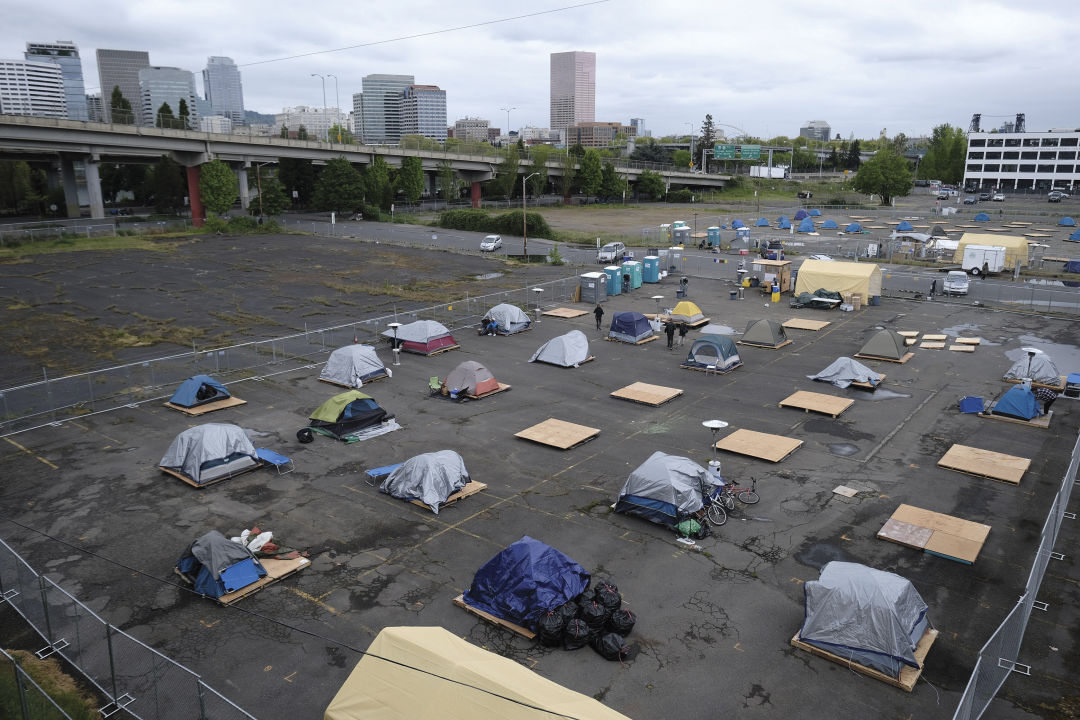How One Portland Neighborhood Partnered with a Homeless Encampment
Faced with an influx of homeless neighbors, a Southeast Portland neighborhood association got creative.

ON A CHILLY DECEMBER DAY THREE YEARS AGO, I made the radical decision to get to know my houseless neighbors. This was at the height of the pandemic, when a homeless camp had formed around Sunnyside Environmental School, and members of the Sunnyside Neighborhood Association decided to introduce ourselves.
We sought professional help: Raven Drake, a manager with Street Roots, joined us one morning to say hello by “knocking” on folks’ tents: you say “knock-knock!” and identify yourself, and announce what gifts you come bearing—in our case, cold-weather gear and clementines. A handful of campers joined us near the school’s play area, and we slowly formed a circle on the blacktop to ask what they needed most.
Their answers? More than anything, they wanted showers, prepaid laundromat cards, and clean clothes.
We decided then to provide access to basic hygiene services that the City of Portland wasn’t delivering in our community. One neighbor volunteered to be the “trash coordinator,” which required calling the city to demand regular trash service. I took on hygiene: the Groves Church offered us use of its showers twice weekly at the Sunnyside Community House (formerly the historic Sunnyside United Methodist Church), as long as we always had two volunteers on site and required masks.
I shamelessly asked neighbors, friends, and work colleagues to volunteer. Our program attracted people like S., who brought his radio to the shower and sang at top volume along with Led Zeppelin. There was J., whose bar had shuttered during the pandemic, and who sent me texts saying, “I appreciate you and what you’re doing. Thank you.” And R., a young and aimless coffee connoisseur caring for a schizophrenic former girlfriend, who made us pour-over coffee with local beans he’d bought with food stamps.
Before I knew it, I was coleading the Sunnyside Shower Project, which is now a 38-person volunteer program providing access to showers, bathrooms, and clothing three days a week, serving around 100 locals per year with 18 shower slots per week. To be sure, we had challenges, requiring us to develop incident protocols. Some houseless folks—not necessarily our regulars—broke church windows when told they couldn’t camp on the front steps. One regular wandered into other parts of the church and stole a wireless speaker from the basement, which we replaced. Another harassed several tenants and was banned from the building.
But these were exceptions. My greatest joy has been befriending the regulars, like Mark McCarthy, a gregarious man in his early 60s and 17-year veteran of living on the streets. He successfully kicked a meth habit, and lived in doorways rather than camps as a way to stay away from drugs. A volunteer eventually connected him to a case manager at Northwest Pilot Project, and he has since gained housing and is starting to address long-ignored health issues. Another regular, Marshall L., also found housing via Northwest Pilot Project and helps others by connecting them to us for showers and additional services.
In fact, many of these people I write about are now off the streets—in part because of the human connections they made with volunteers at the Shower Project. Should it be a great surprise that chatting with someone week in and week out might build trust, and that they might ask us to help them find stability?
What’s astonished me and other volunteers is how this simple act of helping our unhoused neighbors access basic hygiene services—which our city and county should have figured out how to offer by now—has forged community. At a time when many people post surveillance videos of houseless residents on Nextdoor, we are laughing with our neighbors’ jokes, commiserating with their bad news, and offering trail mix and tea. While other Portlanders may perceive them as scary, I actually feel safer in my neighborhood because I know most of our houseless neighbors on a first-name basis.
These relationships are two-way streets. A neighbor named Kris regularly brought us bouquets of wildflowers when she came to shower. One regular fixed my bike, and would not accept cash as payment, so I baked him chocolate chip cookies. Mark has brought me lovely “ground scores”—from cloisonné earrings to a muffin tin.
We’ve expanded, figuring out policies and procedures, designing flyers, organizing Narcan trainings, and running needs assessments for our guests. We’ve paid one of our unhoused visitors a small stipend for his site manager work, thanks to a grant from Southeast Uplift. I tell you this not to brag but to demonstrate that neighborhood associations don’t need to be bastions of privilege and not-in-my-backyard policies. They can be places of activism and radical social change. Or at the very least, sources of practical solutions to the very real challenges of living outside.
I used to walk past houseless people on the street, feeling incapable of helping, let alone engaging. Now, when I jog at Laurelhurst Park or pop into the Belmont library, I say hello to the people I know, sometimes even stopping for a chat. Our unhoused neighbors are just that: our neighbors.
For this and related articles, please visit Portland Monthly

Leave a Reply
Want to join the discussion?Feel free to contribute!